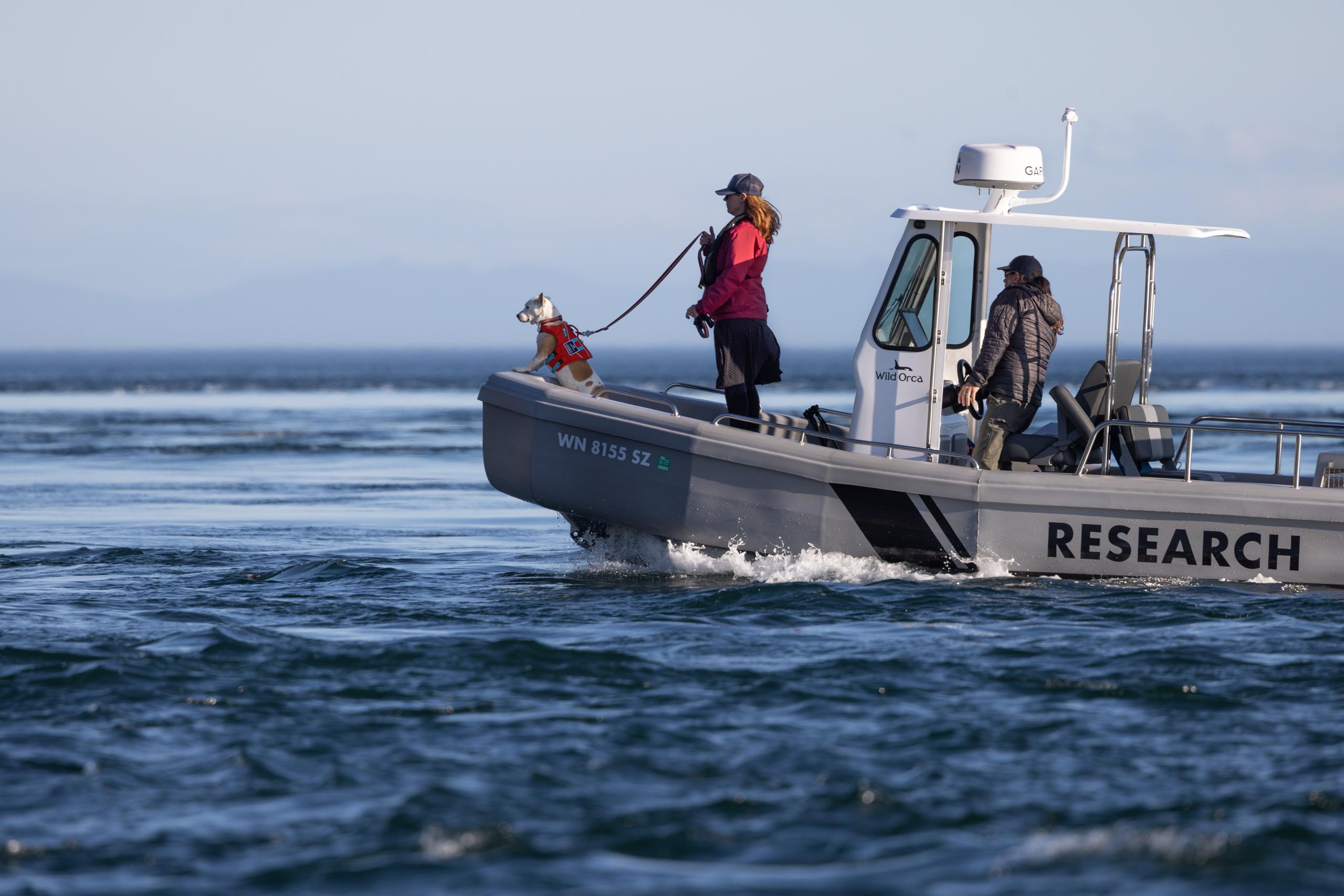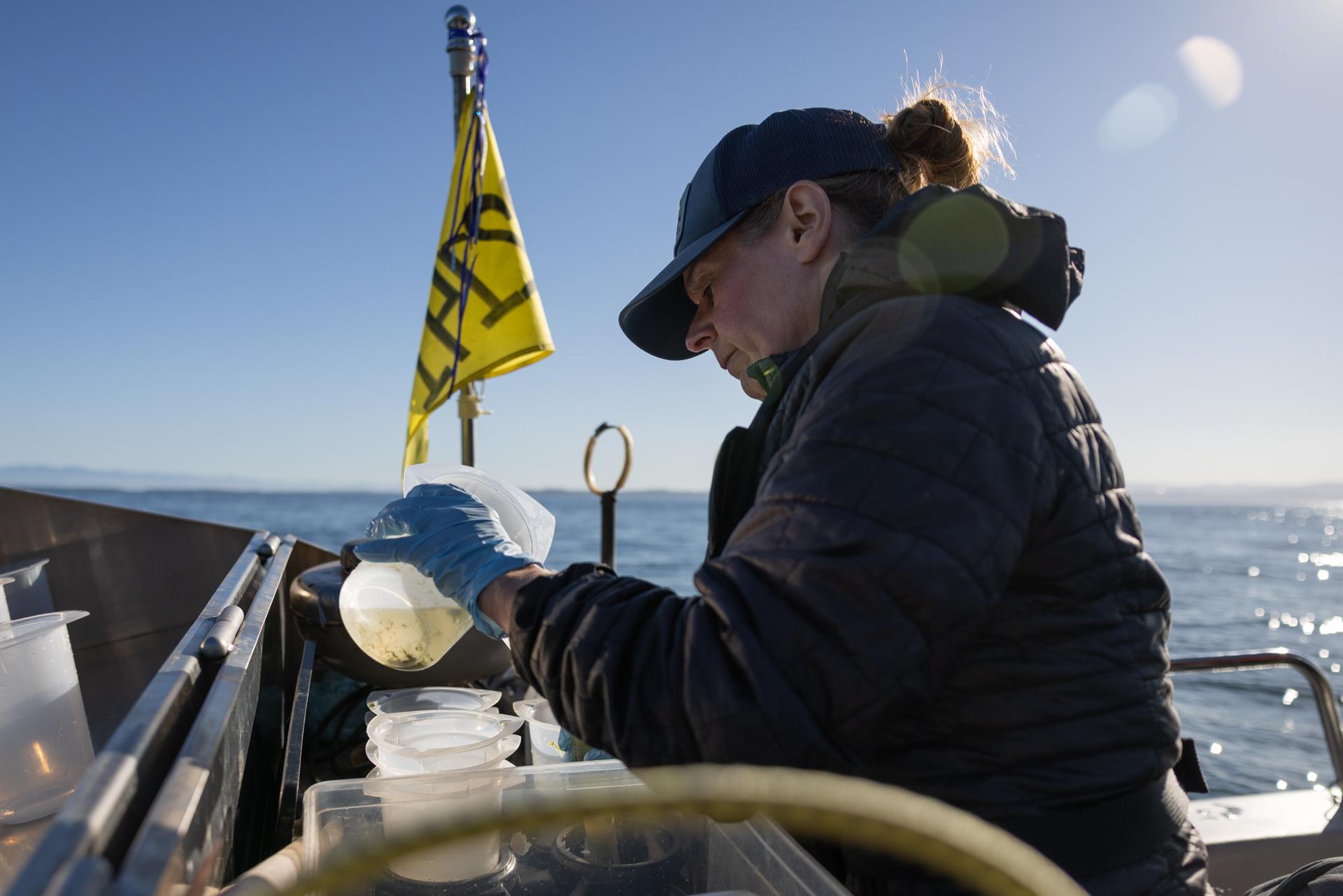The Orca Fund Enters Its Third and Final Funding Round

The Wild Orca team uses scent detection dogs to collect SRO fecal samples. Photo credit: Wild Orca.
After three annual funding cycles, the Rose Foundation’s Orca Fund will be closing this December. The fund was formed in 2017, when a salmon farming net-pen near Puget Sound’s Cypress Island collapsed and spilled over 300,000 invasive Atlantic salmon infected with an exotic virus. The spill threatened the native salmon throughout Puget Sound and the Salish Sea, compromising the primary food source of the region’s iconic and beleaguered Southern Resident Orcas (SROs). As a result of legal action initiated by Wild Fish Conservancy, Cook Aquaculture, the owner of the net pens, agreed to create a mitigation fund exceeding $1 million to support projects designed to improve the water quality and/or aquatic habitat of Puget Sound. The funds were placed with the Rose Foundation to be distributed to groups whose work would benefit the SRO population.
Given the limited funding and the enormous scope of the problem, the Rose Foundation had to decide the most impactful avenue for supporting SRO recovery. Rose, seeing a gap in high quality research, decided to focus funding towards projects that would fill gaps in knowledge about SRO health. However, research was not the only area of interest for Rose. While orca conservation and habitat health are highly technical fields, technical researchers don’t always make the best change makers with regards to social and political movements. As the Fund is designed to improve the conditions of the Puget Sound and Salish Sea, grantees needed to go beyond technical research and apply their findings to shift public policy and/or public attitudes about orcas. With the Orca Fund ending this year, two grantees in particular, Wild Orca and the University of Washington Whale and Dolphin Ecology Lab (WADE), are each bringing something unique but complementary to translate science into action.

The wild orca team collects SRO fecal samples for lab analysis. Photo credit: Wild Orca
Wild Orca has been monitoring the health of SROs for the past 15 years. Using scent detection dogs, the group non-invasively collects fecal samples for lab analysis to monitor SRO reproductive health and hormone levels related to stress and nutrition. With funding from the Rose Foundation, Wild Orca will continue to monitor and track the health of SROs to better understand the health of the Salish Sea, their core summer habitat, and the health of wild Chinook salmon populations, their primary prey species.
With its Orca Fund grant, WADE will interpret this research by sequencing DNA from up to 100 fecal samples collected by Wild Orca during 2020-2024 to improve understanding of SRO diet and foraging behavior. To support this work, WADE will train an intern from a historically marginalized community who will work alongside a scientist from the San Diego Zoo Wildlife Alliance.
Following data collection and analysis, the WADE lab and Wild Orca will develop outreach materials and participate in events that keep the public informed of, and engaged in, SRO conservation. The WADE lab will share these results directly with regional, federal and state management agencies to support the conservation of prey resources most heavily used by SRO. Similarly, Wild Orca will notify government agencies and publications of preliminary findings—in addition to authoring peer-reviewed publications.
And while WADE, as a public institution, cannot conduct many advocacy activities beyond research and publishing, Wild Orca advocates with policy makers directly to implement science-based changes for SRO health. Combined, these two organizations make a highly rigorous, highly effective change making operation, increasing the possibility of SRO recovery.
Just like the work of our grantees, the Puget Sound and Salish Sea ecosystem is deeply interconnected. At the top of the food chain, orcas are an indicator species for the overall health of the water and ecosystem. As the only endangered population of orcas in the United States, the plight of the SROs signifies an ecosystem-wide problem. The introduction of dams and other man-made activity has resulted in a huge reduction in salmon activity. With lower prey availability, SROs have lost body weight, limiting breeding activity and driving up infant mortality rates. For these reasons, the wellbeing of the SROs has likely diminished since the Rose Foundation began distributing the $1MIL in funds to Orca-related projects in the Puget Sound and Salish Sea.
The preservation of the SROs is an uphill battle; these systems are interconnected and advocacy of all of them–dam removal, salmon, SROs–is essential to the continuation of this ecosystem. Indeed, many of the Rose Foundations grantees are working on efforts that will benefit SROs for decades to come from dam removal to habitat restoration to limiting the amount of toxics allowed in waterways. We have hope, and good reason to believe, that our Orcas will love on in health and abundance throughout the Salish Sea.
Stay up to date on Wild Orca and WADE’s project at www.wildorca.org/ourwork/research/
Support impactful projects like these by giving to Rose at rosefdn.org/donate